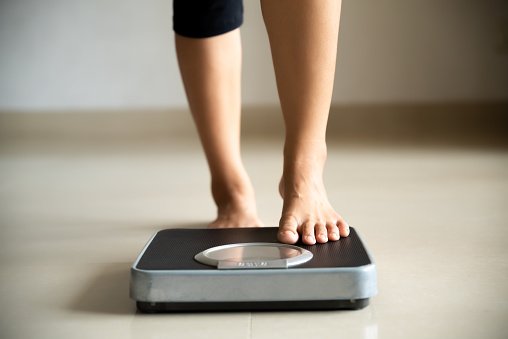How sleep could be affecting your weight loss

We all know certain activities are helpful for weight loss, like giving up junk food in favor of healthier choices and exercising regularly. But many patients don’t realize that getting enough sleep is also important for losing weight. While adults need at least seven hours of uninterrupted sleep at night to feel rested, many people don’t hit that mark. According to a survey conducted by the Centers for Disease Control and Prevention (CDC), more than one-third of U.S. adults report getting less than seven hours of sleep a night, and mounting evidence suggests this could be a large factor in the struggle to lose weight.
People who sleep less than seven hours a night tend to have a higher body mass index (BMI) and have more trouble losing weight in comparison to those who get an adequate night’s sleep — even when they follow the same diet. One study followed 60,000 non-obese nurses for 16 years. At the end of the study, it was found that the nurses who slept five hours or less a night were more likely to be obese than those who slept seven hours or more. Another study found that less sleep increased the likelihood of obesity by 89% for children and by 55% for adults. While these studies were observational, the effects sleep has on weight have also been observed in experimental sleep deprivation studies.
There are several reasons why sleep affects weight.
- Less sleep, larger appetite
Studies have found that many people who don’t get enough sleep report having a larger appetite. This is likely because sleep directly impacts ghrelin and leptin, two hormones that control appetite. Ghrelin is responsible for signaling hunger to the brain, while leptin suppresses hunger and signals fullness. Those who sleep less have been found to have 14.9% higher ghrelin levels and 15.5% lower leptin levels than those who get adequate sleep at night. Cortisol, a stress hormone that can increase appetite, also tends to be higher in people who get less sleep. - More difficult to make healthy choices
Sleep deprivation has been shown to dull the activity in the frontal lobe of the brain, which is the part of the brain that’s responsible for self-control and decision-making. Additionally, the reward centers in the brain are more stimulated by food after a night of poor sleep. People who sleep less are also more likely to choose foods that are high in calories, carbs, or fat. These combined factors can make it difficult to not only choose healthy foods but also to eat healthy portions. - Increased calorie intake
People who don’t get enough sleep at night tend to eat more calories. While this partly due to the hormone factors mentioned above, less total sleep also results in more awake hours. This allows for more time in the day to eat. This is especially true for people who spent a lot of their awake time being inactive, such as sitting in front of the television. Studies have also shown that many people tend to consume excess calories as snacks after dinner. - Decreased resting metabolism
The resting metabolism rate (RMR) is the number of calories a person burns while they’re completely at rest. It’s affected by several factors, including age, weight, height, and gender, and muscle mass. Some studies have suggested that less sleep may lower RMR, while others have found no changes in metabolism. It’s also thought that poor sleep can contribute to muscle loss. Muscle burns more calories at rest than fat does, so losing muscle can directly affect the body’s resting metabolic rate. - Daytime fatigue, less energy
Many people who don’t get enough sleep at night also suffer from daytime fatigue. This can make you less motivated to exercise and makes you more tired during physical activity. Your body produces the most growth hormone during sleep, which not only repairs muscles but also helps burn fat. If you do manage to make it to the gym, you’re less likely to be able to push yourself during your workout and you may not see the same results. - Insulin resistance
Insulin is a hormone that moves the sugar in your body from the bloodstream into your cells, where it can be used as energy. It’s been shown that poor sleep can contribute to cells becoming insulin resistant. This allows more sugar to remain in the bloodstream, which makes the body produce more insulin to compensate. Excess insulin in the bloodstream can make you feel hungrier. It also sends signals to your body that tell it to store more calories as fat. Insulin resistance is a precursor to type 2 diabetes and weight gain. One study suggests that as few as 6 nights can cause cells to become insulin resistant.
Insufficient sleep can create a vicious cycle. As you sleep less, you’re more likely to gain weight. As you gain more weight, it can make it harder to get a good night’s sleep. In addition to making weight loss more challenging, poor sleep may also affect circulation, memory, and social relationships. So not only is good sleep an important part of successful weight loss, but it can also have a significant impact on your overall health and social life.
The good news
If you’re having trouble with weight loss despite doing everything else right, it may be caused by poor or inadequate sleep. We can help you evaluate the factors that are hindering your weight loss and help you overcome them. Our medical weight loss programs in Santa Rosa use a comprehensive multidisciplinary approach to weight control and have helped hundreds of people like you find success.
Overseen by Dr. Jennifer Hubert, our weight loss programs will provide you with an effective weight loss strategy to evaluate and address factors that may cause roadblocks to your goals. If you’re interested in learning more about our weight loss programs in Santa Rosa, contact us today for a consultation.